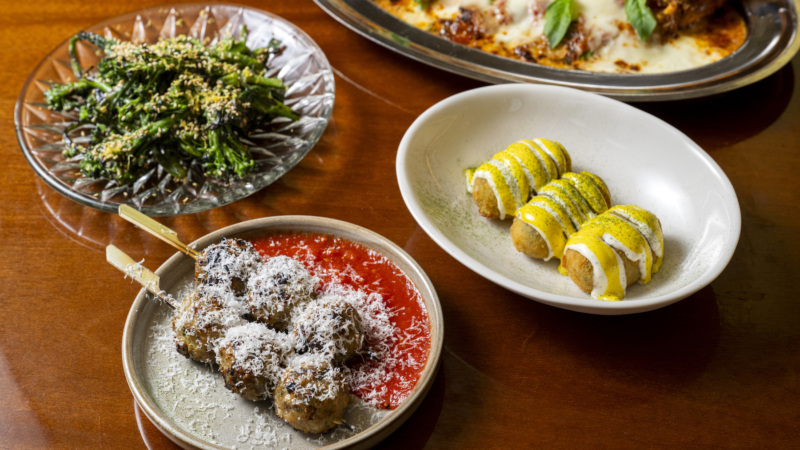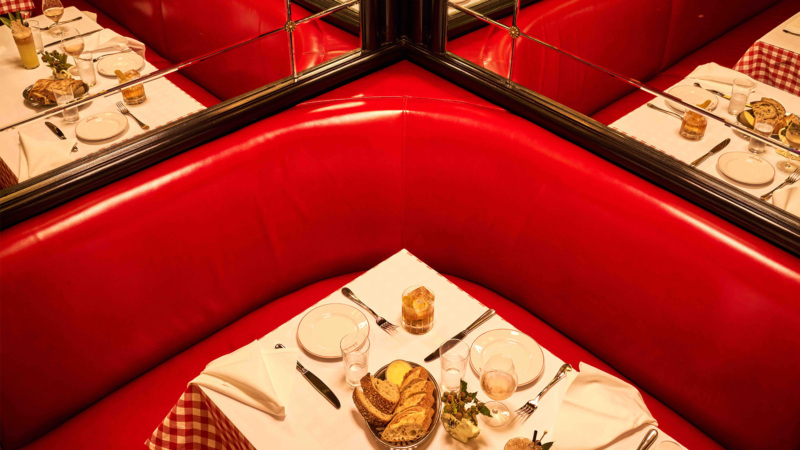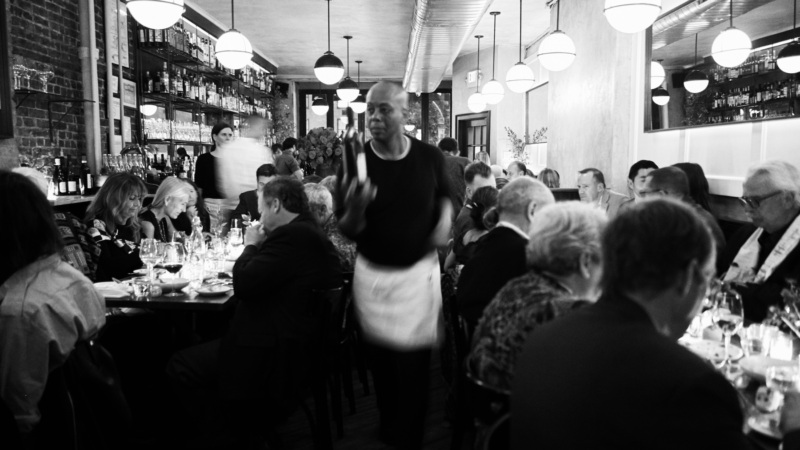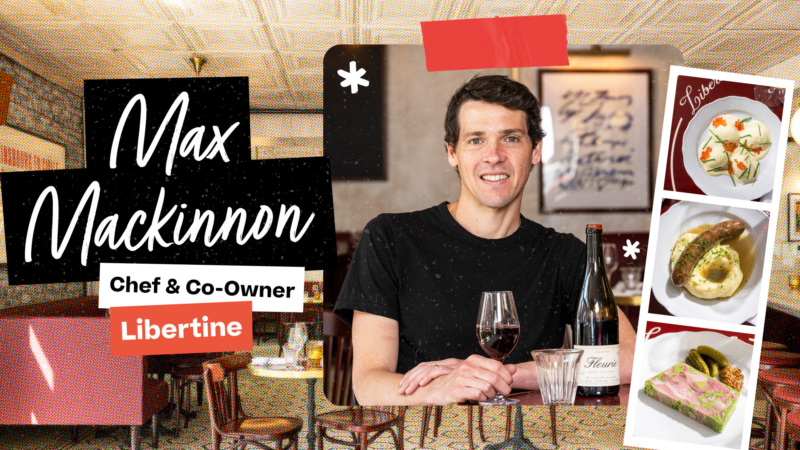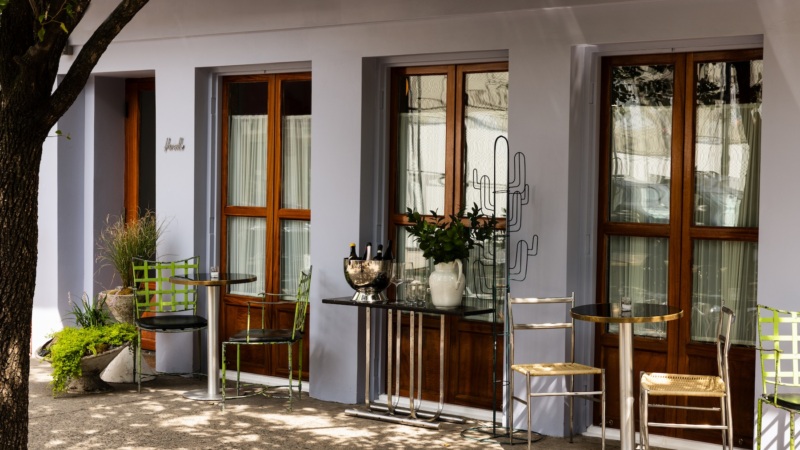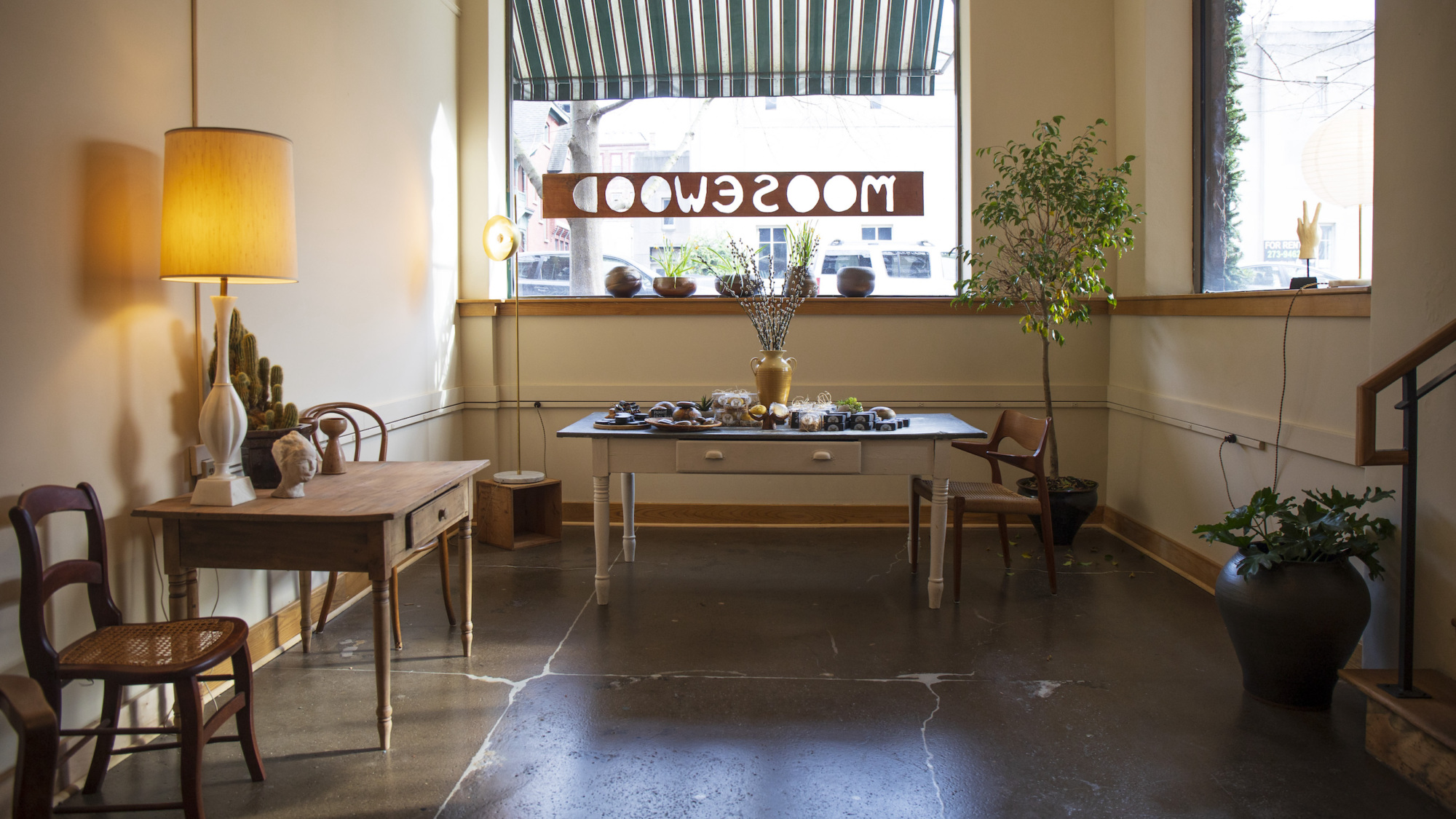
Moosewood, the Legendary Vegetarian Restaurant, Embarks on Its Next Chapter
This past summer, a chalkboard emblazoned with the message “WELCOME MOOSEWOOD!” with two columns of names written below hung outside the kitchen of the restaurant in Ithaca, N.Y. The significance of this earnest tribute to the 19 former Moosewood collective members wasn’t obvious to most visitors. But in this highly engaged Finger Lakes town, with a population of approximately 30,000 residents, a figure that almost doubles during the academic school year, regulars understood.
The sign made public a major change in the famed business. Located on the ground floor of the DeWitt Mall that’s functioned both as a community gathering spot and a downtown tourist destination, Moosewood is, well, more or less a national institution. The framed trio of James Beard medals on display next to the host stand reinforces that status. Moosewood was a groundbreaking restaurant, a fundamental part of the radical countercultural food movement. With the restaurant, and with its series of cookbooks, Moosewood brought elements of farm-to-table and plant-based eating into the broader consciousness before subsequent seminal restaurants like Greens in San Francisco and others that followed.
Today, however, Moosewood is at an inflection point. What started as an experiment of its time turned out to have surprising longevity and rare is the collectively run, non-hierarchical enterprise that can last and even thrive for nearly five decades. Even before the pandemic, there was discussion among the largely retired members of the collective to sell. And earlier this year, the 19 individuals who together owned and shared duties running the restaurant and managing its widely known intellectual property ceded most of their roles and stakes to a new ownership structure led by Ithaca native Danica Wilcox.
“The rest of the world caught up with Moosewood, and Moosewood didn’t really move forward,” Wilcox says. Now determining where it goes from here is up to Wilcox and two business partners: artist Nicholas Woods, her business and life partner, and food industry veteran Eric Rosenfeld.
Some iconic restaurants can and often should carry on within an amber-hued nostalgia bubble — please never, ever change, Musso & Frank Grill and Grand Central Oyster Bar — but Moosewood is different. A radical, grassroots project that has weathered the ups and downs of food trends and economic cycles like Moosewood faces a different mandate. It arguably owes more to itself, to its local community and wider audience, and to history than to allow itself to fall into complacency.
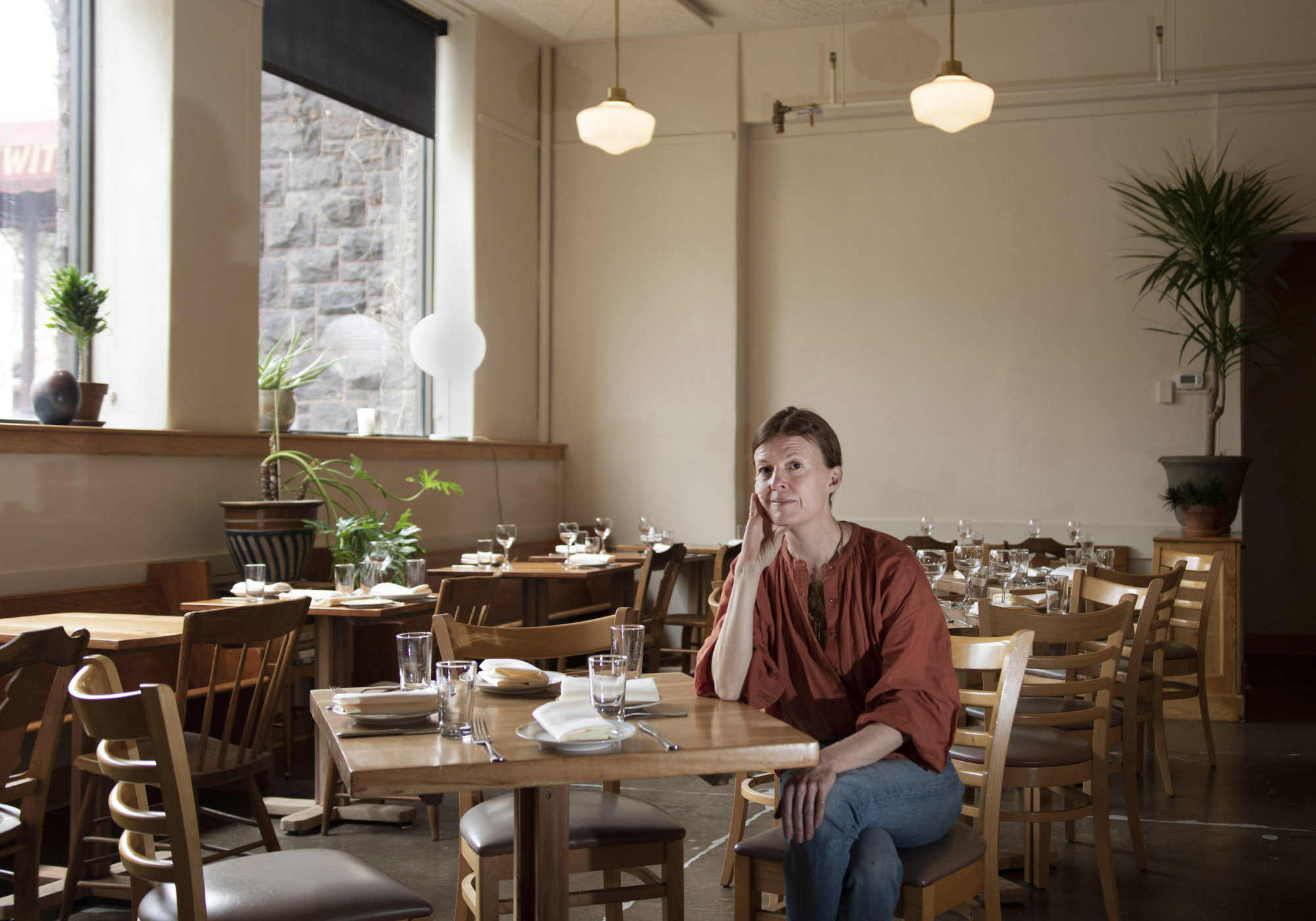
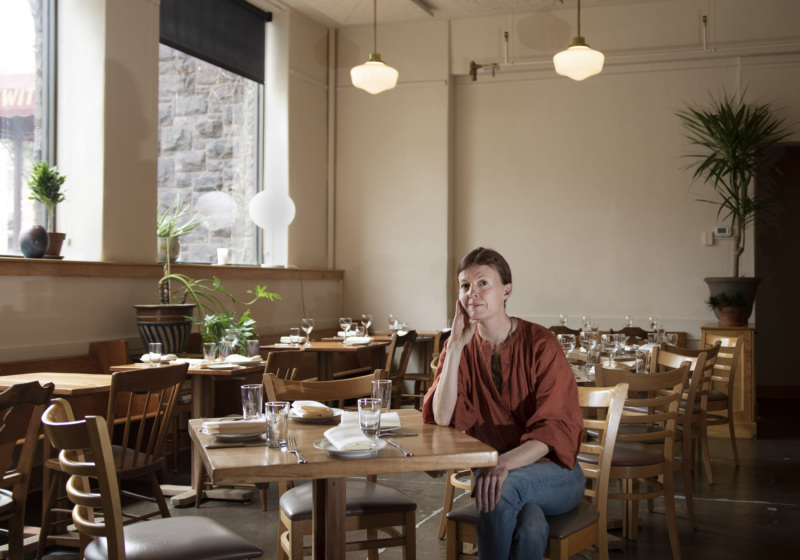
*****
Ithaca is mostly known for two destinations: Cornell University and Moosewood. Once a hub of back-to-the-landers and early environmental consciousness thanks to its remarkable natural beauty and agricultural resources, as well as the presence of Cornell and Ithaca College, the setting was ripe for food-focused activism in the 1970s. A group of mostly well-traveled and progressive friends joined forces to start Moosewood as a cooperatively operated venture in 1973. By 1978, the restaurant was run by a newly organized employee collective, many of whom were early LGBTQ+ rights pioneers who forged ahead with a new consensus- and health-oriented paradigm.
Moosewood’s series of bestselling cookbooks helped spread the gospel and became home kitchen staples with titles that are still in print. (Although it should be noted Mollie Katzen, author of the first classic title published in 1974, famously split from the group.) Many Baby Boomers and Gen Xers embarked on their lives as young adults with a copy of the original Moosewood Cookbook and the volumes that followed. I was one of them.
In the early 1990s, I headed off to college with a newly published paperback edition of Sundays at Moosewood Restaurant. But well before then, I felt Moosewood’s influence from across the country. In the alt-food haven that was the Los Angeles I grew up in during late 1970s and 1980s, my cousin David Hirsch, who began his long career at Moosewood in 1976, had an indelible impact on our family’s kitchen when he came to visit us in California. Decades later, the spaghetti with sautéed broccoli and garlic that David made for us remains a staple in my comfort cooking repertoire. I also wound up marrying an Ithaca native, which would repeatedly bring me back to the restaurant over the years.


*****
Change has to happen incrementally in a space with myriad social and emotional attachments. For her part, Wilcox is candidly clear-eyed about the restaurant, largely because her mother, Kip Wilcox, spent decades as part of the collective. Any critique she has of it comes from a place of deep love. Owning it was something she didn’t anticipate.
Wilcox essentially grew up at Moosewood, waiting tables during school breaks and summers and pitching in wherever needed, as many Moosewood kids were called upon to do. She became a writer and multidisciplinary creative in New York City and Spain, building a career that included jewelry design, interior styling, and design. She also owned a chic home and lifestyle boutique in the town of Pollença on Mallorca.
When the largely retired Moosewood collective members needed help cleaning up the space to make the business more attractive to sell, an avenue they began to pursue before the pandemic, Wilcox offered to step in and offer her sharp design eye and familiarity with the soul of the place.
International shutdowns interrupted her plans to come to Ithaca in spring 2020. Then after negotiations, perhaps no one was more shocked about the decision she made to move her family from Mallorca back to her hometown in summer 2021 and buy Moosewood than Wilcox herself.
“My high school job was not my fantasy of my life,” she reflects. “But I went and had a pretty wild, fantastic life for 30 years. And now this is a pretty nice place to land and to come back to.”
With 130 total seats indoors and outside and serving 400 covers during the peak summer season, taking over Moosewood is a tall order, especially for Wilcox and her partner Woods, both of whom are not trained restaurateurs. “It’s a good restaurant to buy because it is very busy,” Wilcox says.
Some iconic restaurants can and often should carry on within an amber-hued nostalgia bubble — but Moosewood is different. It arguably owes more to itself, to its local community and wider audience, and to history than to allow itself to fall into complacency.
*****
Changes are happening, though, slowly but surely. Wilcox firmly believes Moosewood “should be a cozy and comfortable and beautiful place to eat in,” so the aesthetically oriented couple undertook a subtle makeover for it this past winter. Wilcox and Woods repainted the interiors, exposed and polished the concrete floors in the mixed-use, century-plus-old building that was the former location of Ithaca High School. Revamped lighting showcases a mix of contemporary pieces that were either purchased or fabricated by Woods, and a selection of his original paintings were installed for the restaurant’s soft relaunch. Wilcox is mindful to ensure cloth napkins and candles are on each table, the bathroom is pleasant, and other small details are attended to in a way that feels unfussy and on-brand. A repaired wood-burning fireplace will get going when temperatures drop.
“Figuring out how to now take it to the next level and modernize the ethos of the food” is the arguably harder part, she notes. So is keeping the menu and pricing within reach — especially to locals — in a world of rising food and labor costs. Add to that the challenges of toggling between managing high summer demand and riding out the leaner months during Ithaca’s brutal winters when folks hunker down and are generally less eager to eat out. It’s no wonder sharing the burden with others was an appealing option for collective members all those years.
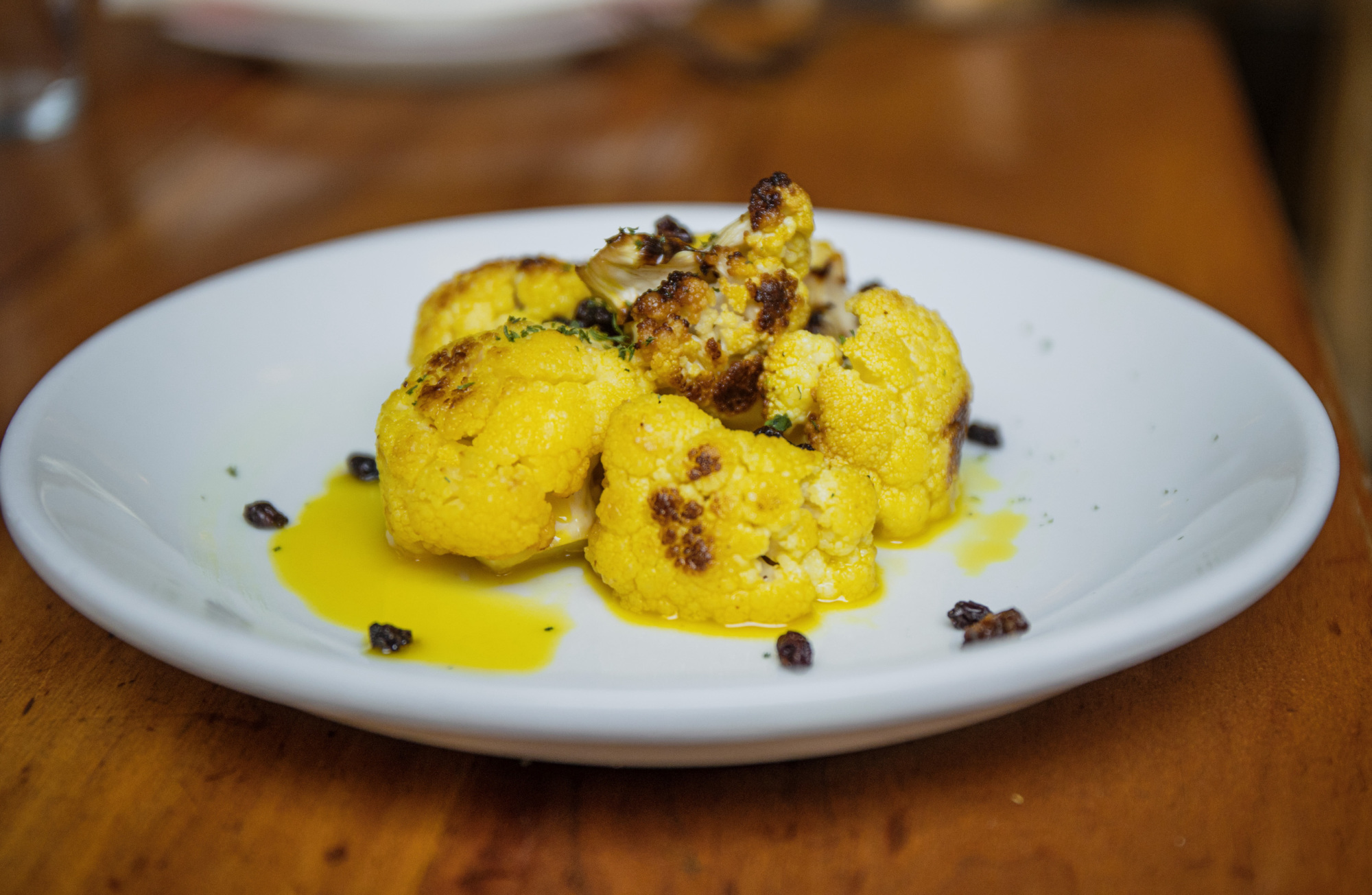


All that said, Wilcox is ideally positioned to sensitively usher Moosewood into a new era. Finger Lakes tourism is on the upswing, with food and wine savvy travelers visiting the New York wine trails populated by O.G. heavy hitters such as Dr. Konstantin Frank and Hermann J. Wiemer. A next generation of passionate makers, including Ben Riccardi of Osmote Wine in nearby Burdett on Seneca Lake, are coming home to make their mark and help develop the lesser-known legacy of this scrappy, under-the-radar wine culture. The Finger Lakes hospitality ecosystem isn’t that of Napa or Sonoma, but restaurants in the vein of Hazelnut Kitchen in Trumansburg, FLX Table in Geneva, and Rose Tavern in Canandaigua help round out the destination-worthy options.
Another fundamental part of Moosewood’s legacy is its association with vegetarianism. However, at the restaurant in Ithaca, dishes that included meat were served early on, and the menu eventually embraced pescatarianism. But largely because of the cookbooks, Moosewood is forever tied to vegetarianism.
This category isn’t Wilcox’s primary culinary goal. “It will never be exclusively vegetarian,” she says. “Well, I can’t say ‘never,’ but I think we just want to be as local as possible.”
Menu tweaks have been underway for a few months now. Instead of serving what Wilcox calls “an Olive Garden salad” in winter, ingredients are more seasonal — shaved root vegetables are likely to make an appearance — as local as purveyor costs and customer pricing concerns allow. The Daily Special includes rotating soup and salad combos served with bread from Wide Awake Bakery. A lentil and apple salad topped with Lively Run Goat Dairy chèvre, and spaghetti with fresh local mushrooms and gremolata are sophisticated updates of a cooking style that feels appropriately homey and therefore very Moosewood.
The globe-trotting instinct often typical of post-hippie health food restaurants and from Moosewood’s own eclectic traditions continues to manifest itself. Curries and stews, for example, don’t necessarily claim to be authentic. Unsurprisingly, Moosewood makes a veggie burger that doesn’t involve lab-grown plant proteins, and the kitchen team has added more vegan and gluten free dishes as tastes and trends dictate. The cheese plate features New York state-made products, and diners can indulge in the beloved brownie à la mode and a vegan chocolate cake.
For clientele who might raise an eyebrow about recent prices, Wilcox maintains transparency, posting on the restaurant’s Instagram feed about Moosewood’s ethical commitment to keep up with the realities of the hospitality industry and food systems. “Remaining accessible” is always part of the Moosewood mission, she says.
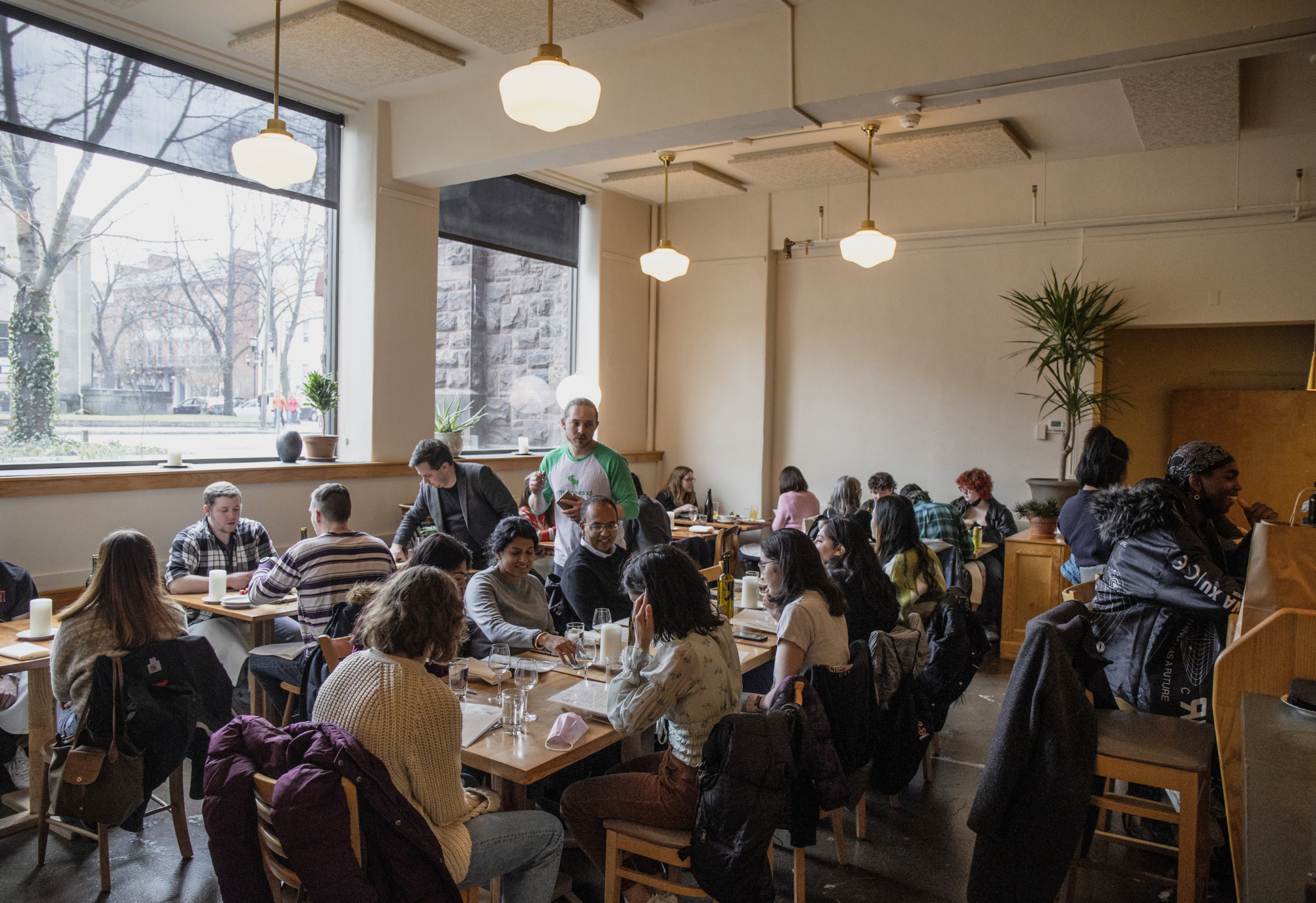
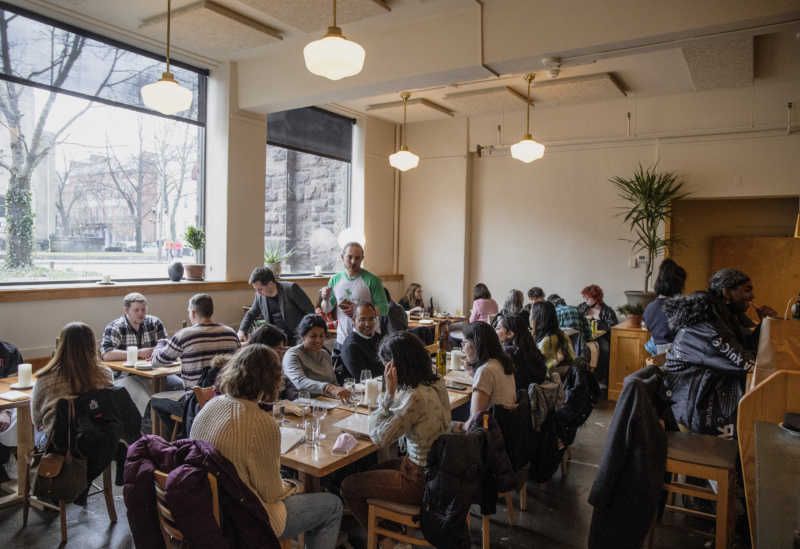
*****
Strategically plugging into local resources is a way to keep Moosewood both historically significant and relevant. Moosewood has maintained relationships with the region’s robust food and beverage network, which includes the town’s beloved farmers market. Its name recognition means that over time it’s become a valued platform to support other local businesses. Wilcox collaborates with Ithaca Wine Ventures founder Richy Petrina to host wine tastings at the restaurant, for instance, and Cornell student Ray Lam develops the cocktail program that highlights grain-to-glass spirits from Finger Lakes Distilling.
Former collective members are still involved, too. Ned Asta writes and draws the charming menus and works service. Sara Robbins cooks the daily soups, a Moosewood menu mainstay. David Dietrich is on handyman duties. “There’s a lot of consistency,” Wilcox notes. While not a collective member, 16-year employee Tim Mooney is the primary kitchen staffer; he now works with consulting chef Adam Shafer, a Corning, N.Y., native and alum of the aforementioned Greens, to make ongoing adjustments. And Kip is an always-willing informal advisor.
Wilcox harnesses her longstanding Ithaca and Finger Lakes personal connections to update aspects of the culinary program, too. Wilcox has organized a cider dinner with the Merwin family, longtime friends and owners of Black Diamond Farm and Cider. Among the local honeys served is the cold smoked raw variety from Bright Raven Farm and Apiary in Trumansburg, owned by Teresa Vanek, a friend from high school. Another former high school peer, Betsye Violette, is the restaurant’s pastry chef.
Regarding the aforementioned chalkboard, the names of the collective members remained on view for the first few months of the transition. Wilcox has since updated it to identify Moosewood’s local purveyors as the restaurant evolves into its next chapter.
Moosewood is open Wednesday through Sundays from 11:30 a.m. to 2:30 p.m. and from 5 to 9 p.m.
Jessica Ritz is a freelance writer who has contributed to outlets including Architectural Digest, Metropolis, Los Angeles Times, Los Angeles Magazine, C Magazine, Sunset, Palm Springs Life, Garden & Gun, and American Way. Her reporting passions include architecture, interior design, art, and food. Follow her at jessnritz.com and @jessnritz, and follow Resy, too.
Discover More
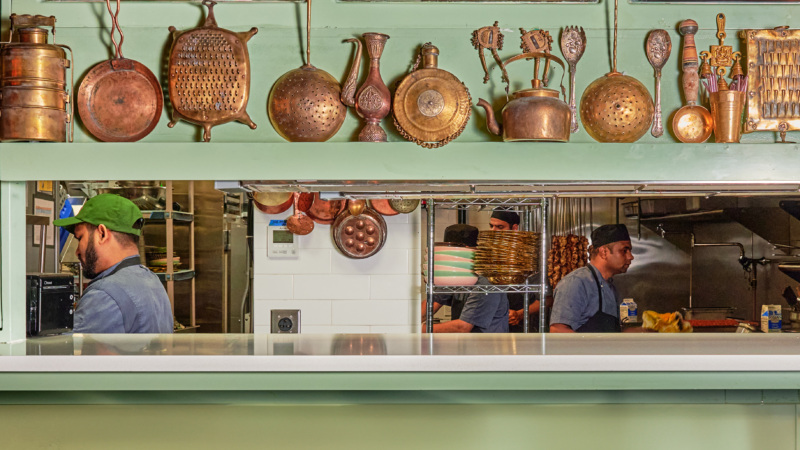
Stephen Satterfield's Corner Table



